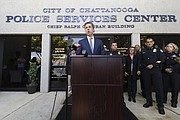Chattanooga will lose an important asset in July when Police Chief Fred Fletcher retires.
Fletcher was sworn in on June 12, 2014, and in that time he has dealt with some of the most horrific emergencies this city has seen in decades.
Times Free Press reporter Emmett Gienapp phrased it "three of the most tumultuous years for local law enforcement in recent history." And that pretty well sums it up. But what a reporter's requirement for objectivity wouldn't allow him to say was this: Fletcher shouldered the incidents and days of turmoil with immense capability and grace - a capability and a grace that we will miss when he is gone.
Since Fletcher was sworn in on June 12, 2014, Chattanooga weathered a domestic terrorist attack in July 2015 that left five military servicemen dead, and two horrible and traumatic vehicle crashes - an Interstate 75 truck accident that claimed six lives in 2015 and the crash of a school bus that killed six Woodmore Elementary School students in 2016. Also during Fletcher's tenure as chief, he led the remaking of the department and navigated through a controversial implementation of Chattanooga's anti-gang Violence Reduction Initiative.
The $1 million initiative (mostly spent on consultant fees with a New York-based research think tank at John Jay College of Criminal Justice that developed the program) relies on "focused deterrence" through cooperation by police, prosecutors and social service groups. The goal is to crack down on the few who shoot while offering services such as job training and education to people willing to give up their guns.
The program almost immediately hit roadblocks, first from officers who didn't like change and didn't buy in (11 of 12 permanent members of CPD's Street Crimes Response Team requested transfers out of the unit during a 10-day period), then from public disagreements among city officials and the Hamilton County District Attorney's office over how cases reached disposition. Most cases were dismissed or pleaded down to misdemeanors, eating away at the program's intended effect.
Along the way, the program took heat in news reports because gang-related shootings didn't immediately decrease. Instead, they rose from 63 to 80 in 2015 and remained at 80 again in 2016, according to police.
Too often, what those accounts failed to show was that all shootings increased, yet the percentage of gang-related shootings dropped - from 67 percent of all shootings in 2015 to 58 percent in 2016.
Moreover, just ask yourselves: How many gang shootings might we be tallying today had the city - and Chief Fletcher in particular - not taken action when they did?
Perhaps more importantly, ask yourselves when was the last time you heard about horrendous police brutality or racial discord in Chattanooga. The quick answer is this: Often before, but not since, Fletcher took over. (Remember the 2012 Adam Tatum police beating that left the federal inmate at a halfway house with multiple fractures in both legs after video showed two officers struck him more than 100 times?) That's because Fletcher has always been a strong believer in police building strong community relationships - not just strong community fear.
Fletcher, who promised to "shake the snow globe" in the police department when he took office, credited 2016's gang-shootings plateau to several anti-violence strategies that police deployed after May 1, including one program in which police track which weeks are typically the most violent and proactively increase manpower to try to buck the trends.
Mayor Andy Berke celebrated Fletcher's accomplishments last week when the two announced Fletcher's retirement plan.
We wish Fletcher a hearty Godspeed in his retirement, and we wish Mayor Andy Berke full support in finding and choosing Fletcher's replacement.
